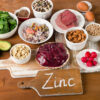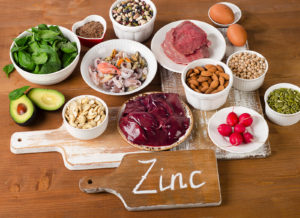
All About Zinc
When you think of zinc, maybe the first thing that comes to mind are batteries. Or, maybe you’ve heard that zinc is good for your immune system. What else could this vaguely metal-like substance you learned about in high school earth science be good for? Believe it or not, zinc is another one of the important ingredients in our Ocu-Plus Formula.
Zinc, as shown by this pie chart, is not often used or associated with food. It is most commonly used in rubber products. But here’s what that pie chart doesn’t show: this is a very versatile chemical element. When it isn’t being used to power our TV remotes or portable speakers, zinc is playing a very important role in the human body.
What Is Zinc?
Without taking you all the way back to grade school, put simply, this nutrient is a chemical element similar to magnesium. It is the 24th most abundant element in the Earth’s crust. In its usable form, zinc is mostly found in Australia, various places in Asia, and right here in the United States.
The element has a long and often disputed history. A German chemist, Andreas Sigismund Marggraf, is credited with being the first to discover it in its pure metallic form in 1746. However, he was not the first to carry out experiments to find pure metallic zinc. He was the first to theorize and describe the process of the experiments.
Zinc has been around since the birth of the Earth. Our archaic ancestors were very crafty and even if they didn’t know it, they used the element in a number of ways.
Going all the way back to the ancient civilizations of Babylonia and Assyria (around 3000 BCE), this element was used in important bronze creations. Zinc salts were also often used for medical purposes in Palestine dating from 1400-1000 BCE.
After the discovery of copper, jewelers started to combine it with zinc to craft beautiful and durable pieces. Of course, it would still be centuries before science would identify and name zinc. The first known use of the word zinc was by an alchemist, Paracelsus, sometime in the 1500s.
Zinc in Today’s Terms
With the advent of modern science, we know that zinc is much more useful. Because it bonds well with other metals, it is often applied in small layers to iron and steel to prevent rusting.
It is also used in manufactured goods like rubber, paint, cosmetics, ink, plastic, batteries, and other electrical equipment.
Of course, we have yet to even mention the best use of this element: health. We have very small amounts of it in our body that are called essential trace amounts. Without these trace amounts, you risk hair loss, loss in immunity functions (for example: slow wound healing time), and stunted growth especially in children. That’s why your mom may make you suck on a zinc lozenge if you are starting to feel under the weather.
Today, scientists suggest that this element can help prevent cancer, diabetes, and heart diseases and conditions, as well as balance hormones and increase fertility.
For Your Vision
We now know that zinc is quite an amazing and versatile element, not only in terms of manufactured goods but also in terms of keeping us healthy. But what does it do for our vision?
It should be no surprise to you by now that this element is found most abundantly in our eyes. This makes it essential for our eye health. Believe it or not, this metal-like substance helps to convert beta carotene from highly pigmented foods like carrots and spinach into usable vitamin A for our eyes. The vitamin A can then create a pigment called melanin, which protects the macula and the retina. That’s quite a complicated but essential process!
This element is especially beneficial for supporting good night vision, even more so for those suffering from glaucoma. The antioxidant properties in zinc can also help counteract conditions like age-related macular degeneration.
Zinc is essential to keeping our retina and macula in good health and working properly. Though it’s only needed in trace amounts, these trace amounts are incredibly important.
Where to Find It
 You don’t need to dig to the center of the earth to find zinc. It can be found in foods, animals, metals and mines. Most of it is actually mined in the aforementioned countries and continents.
You don’t need to dig to the center of the earth to find zinc. It can be found in foods, animals, metals and mines. Most of it is actually mined in the aforementioned countries and continents.
But don’t worry; you don’t need to go mining to get your fix. Zinc supplements are a great and easy way to get your daily recommended zinc amount.
Zinc deficiencies are very rare in the U.S. So rare, in fact, that you’d need to want to develop a deficiency and work hard to get it. But that doesn’t mean it doesn’t happen. Supplements are often used in only treating deficiencies when they do happen. Otherwise, you can get your required amount of zinc from everyday foods.
If you are thinking of taking supplements, it is incredibly important to know the correct dosage for you as an individual. The best way to go about this is to do some research and talk to your doctor.
Zinc is also an ingredient found in our Ocu-Plus Formula. We have incorporated it into an easy supplement that comes with so many benefits from other essential vitamins and nutrients for your eyes. We believe this is the best way to get your recommended dose!
Zinc in Foods
A supplement may not be the right solution for you, and that’s just fine! Zinc is found in a ton of delicious foods. By making sure you incorporate some of these foods into your weekly meals, you’ll likely get the perfect amount for your eyes.
Here are some of our favorite zinc-packed foods:
-
- Oysters
- Lean beef (cooked)
- Roasted pumpkin and squash seeds
- Cashews
- Chicken
- Pork
- Cocoa powder and dark chocolate
And the list goes on and on! These are common foods, which is the reason why zinc deficiencies are so rare.
This is an important component in keeping your vision healthy and spry. Don’t skip out on the above foods and talk to your doctor if you feel that you may have a zinc deficiency.
Our Rebuild Your Vision Ocu-Plus Formula Contains All 17 Vitamins, Minerals, and Herbal Supplements to Improve Your Eye Health!




Interesting keep the good info =)
Very useful. Thank you.